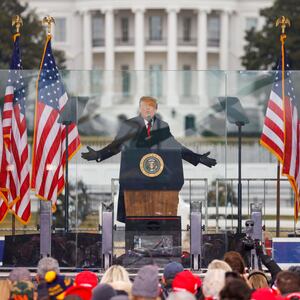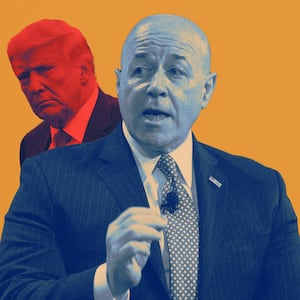For the third time this year, former President Donald Trump has been indicted by a grand jury—this time over his botched attempt to cling to power after losing the 2020 election.
While the 45-page indictment itself is hardly unprecedented at this point, these particular charges mark the first time in the country’s history that an American president has been criminally accused of hatching a scheme that put the nation’s democracy at risk.
The indictment charged Trump with defrauding the nation with fake electors to sway the 2020 election, obstructing Congress to stop it from certifying votes, and conspiring to violate Americans’ civil rights.
“The defendant lost the 2020 presidential election,” the indictment stated in no uncertain terms. “Despite having lost, the defendant was determined to remain in power. So for more than two months following election day on November 3, 2020, the defendant spread lies that there had been outcome-determinative fraud in the election and that he had actually won.”
“These claims were false, and the defendant knew that they were false,” it added, accusing Trump of doing it to “create an intense national atmosphere of mistrust and anger, and erode public faith in the administration of the election.”
Trump responded to the news Tuesday night by comparing prosecutors to Nazis.
If convicted, Trump could face years in prison. But more importantly, he would be branded a felon for imperiling the nation and violating the very Constitution he swore to protect in 2017 as its commander-in-chief. The nature of the charges are particularly serious, touching on violations of laws that date back to the last time the United States faced an existential crisis during the Civil War.
This is the second indictment stemming from the investigation led by Department of Justice Special Counsel Jack Smith, who was appointed in November by the nation’s attorney general to conduct an independent probe.
In a brief press conference in Washington Tuesday night, Smith said the indictment was the natural extension of the long-running DOJ investigation of the attack on Congress by Trump loyalists.
“The attack on our nation’s Capitol on January 6th, 2021 was an unprecedented assault on the seat of American democracy,” he said. “It was fueled by lies—lies by the defendant who targeted a bedrock function of the U.S. government.”
Smith made clear that his team would “seek a speedy trial so our evidence can be tested” in a public court, hinting at the possibility that Trump could be found guilty—or acquitted—before the 2024 election.
He took no questions.
Although the indictment notes that Trump worked with “co-conspirators” to defraud the American public, they remained unnamed and uncharged—at the moment.
Extensive reporting by journalists and congressional investigators have shown that Trump worked closely with since-disgraced conservative legal scholar John Eastman, his personal lawyer Rudy Giuliani, attorney Sidney Powell, and Jeffrey Clark, a MAGA loyalist at the DOJ whom Trump tried to elevate to the position of Attorney General.
The indictment seemed to reference all of them as “co-conspirators.”
While the indictment does not name Trump’s alleged co-conspirators, it does provide enough detail to easily identify five of the six by their actions during the tumultuous period between the 2020 election and the attack on the Capitol.
Giuliani takes the highest-ranking spot as co-conspirator No. 1, described by prosecutors as the lawyer who would “spearhead” Trump’s election-challenging effort, tried to pressure fellow Republican and former Arizona House Speaker Rusty Bowers to weaponize his state’s legislature, and delivered a particular speech at Trump’s Jan. 6 rally.
Eastman, the disgraced Trump lawyer, is co-conspirator No. 2, evident by the way the indictment describes his role in crafting the plan to have Pence single-handedly interrupt the nation’s peaceful transfer of power, his interactions with the vice president’s staff, and his own speech at the Jan. 6 rally.
Sidney Powell, the conspiracy-spewing lawyer who commanded what she called Trump’s multi-tentacled “Kraken” lawsuits, is co-conspirator No. 3. She’s the lawyer who sued Georgia’s governor on Nov. 25, 2020 in an attempt to flip election results there and made ludicrous public claims about ballot-counting machine maker Dominion Voting Systems.
Co-conspirator No. 4 is Clark, whom the indictment describes in detail as the DOJ official who broke the rules by meeting with Trump privately at the White House, plotted to weaponize the Justice Department, and tried to make himself AG.
The indictment describes co-conspirator No. 5 as the lawyer who devised the plan to use fake electors by authoring legal memos on Nov. 18 and Dec. 9, 2020, which lines up with the actions taken by a Trump lawyer named Kenneth Chesebro.
A sixth co-conspirator is not as easily identifiable. That person is described as a political consultant who also helped with the fake electors.
Neither Powell nor Clark replied to emails. Chesebro hung up as soon as this Daily Beast reporter identified himself.
Eastman’s lawyer sent a statement late Tuesday night, deriding the indictment as “a misleading presentation of the record to contrive criminal charges against Presidential candidate Trump and to cast ominous aspersions on his close advisors.” Attorney Charles Burnham, stated flatly that said his client is not discussing a plea deal with the feds and won't even consider it, promising that, “If Dr. Eastman is indicted, he will go to trial. If convicted, he will appeal.”
A political adviser for Giuliani, Ted Goodman, also issued a lengthy statement.
“Every fact Mayor Rudy Giuliani possesses about this case establishes the good faith basis President Donald Trump had for the actions he took during the two-month period charged in the indictment,” Goodman said.
“This indictment eviscerates the First Amendment and criminalizes the ruling regime’s number one political opponent for daring to ask questions about the 2020 election results," Goodman continued. "The news today is particularly egregious in light of the growing evidence proving that Joe Biden and his family made millions of dollars in bribes from America’s most intransigent adversaries.”
The indictment also reflects a move by prosecutors to drive a wedge between Trump and the Republicans he recruited to serve as fake electors, noting that they signed up for the task under the impression that their involvement would only matter if his flurry of lawsuits baselessly challenging election results in several states actually managed to reverse his loss.
“Some fraudulent electors were tricked into participating based on the understanding that their votes would be used only if the defendant succeeded,” the indictment stated.
The 45-page grand jury indictment stressed the many ways that Trump repeatedly rejected the advice of his White House lawyers, Justice Department top brass, his spy chief, and even his own re-election campaign advisers.
The scathing document quotes one unnamed campaign staffer who lamented the way that Trump and his top lieutenants kept pushing conspiracy theories even when warned that they were totally untrue—and noted that the lies were being routinely shot down in federal courts across the country.
“When our research and campaign legal team can’t back up any of the claims made by our Elite Strike Force Legal Team, you can see why we’re 0-32 on our cases,” this staffer allegedly wrote in an email. “It’s tough to own any of this when it’s all just conspiracy shit beamed down from the mothership.”
Trump’s awkward interactions with his vice president are also detailed in the indictment. Federal prosecutors described how Trump repeatedly tried to pressure former Vice President Mike Pence into abusing his role as head of the Senate to block certification of legitimate electoral college votes, noting how Pence called Trump to wish him a “Merry Christmas,” only to have Trump egg him on.
At one point, Trump allegedly grew frustrated with the evangelical, born-again Christian and said, “You’re too honest.”
The case could go to trial sometime next year—and potentially derail the former president’s current campaign to win the Republican Party’s nomination and return to the White House in 2025.
Smith’s investigation builds on the work of the House Jan. 6 Committee, a separate political inquiry which unearthed key details about the final days of the Trump administration. The congressional probe showed that Trump as president persistently lied to the American public about unfounded fraud claims he knew were false, filed lawsuits backed by conspiracy theories to try to overturn election results in several states, rolled out a focused disinformation campaign to gather loyalists in Washington to disrupt Congress’s certification of 2020 electoral college results on Jan. 6, and called off security measures when he became aware some in the crowd were armed with AR-15 rifles before they stormed the Capitol building.
The threat of indictment on these criminal charges has been on the horizon ever since March 2022, when a federal judge in Santa Ana, California, made a significant finding that criminally implicated Trump directly in a wide-ranging scheme to lie to the country he purported to lead. The judge was overseeing a document dispute when the Jan. 6 Committee tried to get emails from Eastman, the right-wing legal scholar who engineered Trump’s plan to stay in the White House by interrupting congressional certification of election results.
After reviewing the email himself, U.S. District Court Judge David O. Carter determined “more likely than not that President Trump corruptly attempted to obstruct the Joint Session of Congress on January 6, 2021.”
Carter went further in October, writing that “the emails show that President Trump knew that the specific numbers of voter fraud were wrong but continued to tout those numbers, both in court and to the public. The Court finds that these emails are sufficiently related to and in furtherance of a conspiracy to defraud the United States.”
At this point, the former president is fighting off criminal charges in all directions. He is scheduled to be on trial in March 2024 in New York City, where the Manhattan District Attorney is trying to jail him for faking business records in a scheme to save his first successful presidential campaign potentially catastrophic embarrassment when he quietly paid the porn star Stormy Daniels to shut up about their sexual affair.
Then in May 2024, Trump is set to be on trial yet again in South Florida, where Smith’s federal prosecutors are trying to nail him for keeping classified documents after leaving the White House. And there could be a third trial next year as well: The Fulton County District Attorney in Atlanta is conducting a criminal inquiry over the way Trump intimidated an elections official there.
Trump has repeatedly dismissed all these investigations as politically motivated and seems to be using his 2024 presidential run as cover.
Trump, who was twice impeached by Congress but spared conviction by Republicans in the Senate, is the first of the nation’s 46 presidents over 234 years to be criminally indicted after leaving office.







